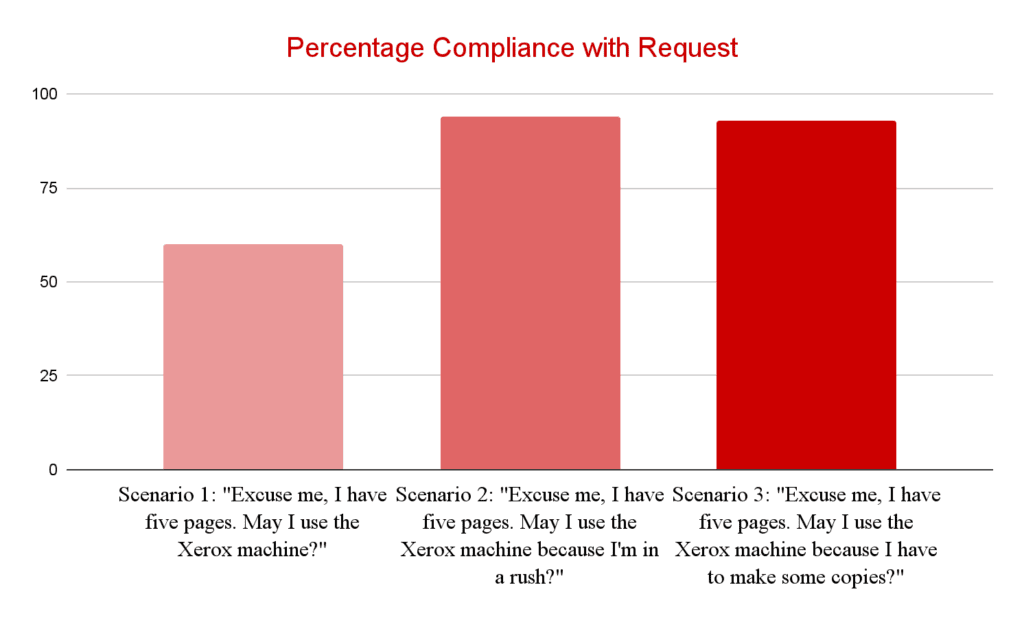It was the end of a long work day back in my early years on tenure track. One of my sons was preschool age and he came to me shortly before his bedtime with a question that went something like, “Mom, can I have another cookie because the one I had earlier wasn’t very good?” My memory of this interaction is a bit fuzzy because for the most part, my brain is worthless after about eight o’clock at night. Thus, my mental and physical resources were not at their peak, and his request sounded reasonable at the time. It wasn’t until a few minutes later when I saw him eating another cookie that I realized what had transpired. My cute little dimpled son had managed to make off with two desserts that night. I thought, “Wait. What just happened here?!?”
Can I Get a “Yes”?
Do you love it when people tell you “Yes?” What about when people tell you “No?” That last one is rarely any fun. We all aim to get more of what we want out of and in life. In our work lives. In our relationships with family, friends, and significant others. We may hope that we will get what we want simply because we deserve it. Because we believe we have earned it. That is often not the case. If we don’t ask, we don’t get. In this post, I am going to give you one ridiculously easy tactic for influencing others to say “Yes” to you. This is super low-lying fruit that even a preschooler can use!
The tactic is based on research that took an experimental approach to subjects using a copy machine and then being interrupted by a confederate. In experimental research, a confederate is an actor who is participating in the experiment so that the researchers can observe how other individuals respond to what the confederate says or does. In this seminal research, the confederate also wanted to use the copier. The study was composed of three different scenarios. In the first scenario, the confederate said to the person currently using the copier (i.e., the subject of the experiment), “Excuse me, I have five pages. May I use the Xerox machine?” (the study was conducted in the 1970s). The subjects being interrupted yielded 60% of the time to the experimenter’s request.
In the second scenario, the confederate asked the subjects currently using the copier, “Excuse me, I have five pages. May I use the Xerox machine because I’m in a rush?” and the compliance rate of the subjects was 94%. I don’t know about you, but the result in this scenario surprised me. Isn’t everyone usually in a rush? Why is someone else’s time and urgency more valuable or important than mine if I’m the one already using the copier.
However, in the third scenario, the confederate asked subjects, “Excuse me, I have five pages. May I use the Xerox machine because I need to make some copies?” Again, the subjects’ compliance was very high – 93%. When this research was conducted, copiers didn’t have all the complex or fancy functions and features they do now. They just made copies! So, again, why did so many subjects yield their time to another person who wanted to use the copier?

Be phrased in the form of a question (because very few of us appreciate being told what to do or feeling bossed around! In fact, it can encourage some people to be downright surly.)
Use the word “because.”
Know What You Really Want
It is critical here to note the importance of knowing exactly what you want and asking specifically for that. Sometimes we have a vague idea of what we want but we have not spent much if any time or effort to really contemplate what would make us happiest, healthiest, or the most productive. Ask yourself, “In my perfect world, what would I want in this situation?” Challenge yourself to come up with several specific things you could ask for that would meet your needs. Then, choose the one that meets your needs and desires most fully. It’s tempting to ask for the first thing that pops into our minds. Make a short list (or a long one!) and then carefully and rigorously identify that one that makes you the happiest or most productive.
Too often we ask for less than what we really want because we think the other person will tell us No, and hearing No is hard on the brain and sometimes hard on the soul. However, if we regularly or habitually ask for less than what would make us phenomenally happier or satisfied, we miss an opportunity to claim value. Do not give up value that you do not have to give up! Do not hamstring yourself before you even get started. We should be realistic in our requests and probably not ask for the moon. However, we should not ask for less than what we really want. Ask for what you truly desire and then if necessary negotiate down from there.
Samsung
I use this tactic at least once a week and even look for opportunities to use it with a silly rationale or reason that follows the word “because” in my request, just to see how often the tactic works. I used it many years ago when our relatively new television went on the fritz. It had suddenly stopped producing sound. You had to turn it off and back on again to get sound. Over a few weeks, the problem grew worse so that after about 10 days, you had to turn it off and on again about a dozen times to get sound. NOT a good thing when your young children want to watch Sesame Street or other television show on a Saturday morning and that’s your only mechanism for sleeping in a bit! I had reported the problem via Samsung’s online support system, but had not received a response yet.
After about two weeks, I called customer support. After explaining that they were having a hard time finding a technician that could get to our location (we lived three hours from any major city), the rep said that she could arrange to have a refurbished television delivered over the next few days. My reply? “I appreciate that. However, would you please send us a new television because my husband will not be happy with a refurbished one?” (Don’t judge me. I was thinking on my feet!). She got quiet and asked if she could put me on hold for a moment. The line went quiet for about five minutes and when the rep got back on the line she said that, yes, they would be sending us a brand new television, this year’s model, within the next five days. Winning. We just have to ask and use the word “because”!
Be Ready to Give and Take
The world is a better place when there is give and take in our relationships. So, if you make a request as outlined above and the other person says Yes, then it behooves you to be ready to say Yes to their requests. Similarly, if someone makes a request of you and you say Yes, then be ready to make a request of your own. For instance, your significant other wants to see a new movie that’s premiering the upcoming weekend. You don’t mind seeing it but it does not jazz you. What jazzes you is Mexican food! So, if your S.O. says, “Hey, could we see that new Marvel movie coming out this weekend because I’ve heard it is supposed to be the movie of the year?” Be ready to say, “Sure. How about we have dinner at that Mexican restaurant down the street from the theater because I’ve been craving guacamole for days?” You have set up a win-win situation here where both of you get what you highly value. Your S.O. gets to see the movie they are excited about and you get to have the Mexican food that makes your stomach happy.
That Second Cookie
Going back to the cookie situation with my son, as I later replayed the conversation with my son over in my mind, I realized that he had used a tactic he learned recently while sitting in my negotiations class at Baylor University. He had come to class with me one day when his school was closed and we discussed the above research and how to use this influence tactic. Though he sat (mostly) quietly in the back, he apparently soaked up the lesson. He then proceeded to use this tactic quite successfully over the coming weeks until I made sure my radar was up and ready for his request for a second dessert. So, use this tactic for good and not for evil (not that cookies are evil – quite the contrary).
Bottom line: To get more of what you want (and help others do the same), put your request in the form of a question and use the word “because.” If silly reasons can work, imagine what logical, data-driven reasons can do!






